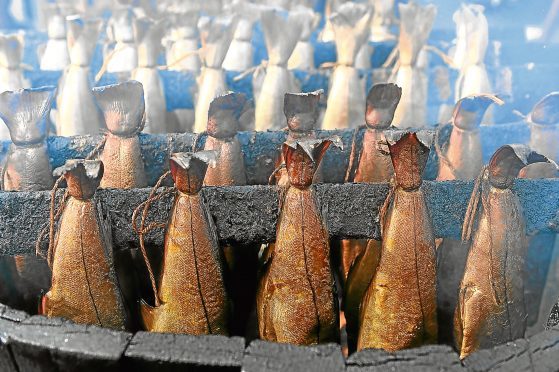Fake US versions of national treasures like the Arbroath Smokie will flood the market if Britain gives in to the demands of American business, say Dundee campaigners.
Trade Justice Dundee warns of a “huge economic impact” on Tayside should the UK scrap the Protected Geographical Indication (PGI) status, which shields Scotch whisky and other products from copies.
American lobbyists have been trying to get Britain to drop the EU protections, and to avoid replicating them, as part of a future US-UK trade deal.
Paul Robison, the chairman of Trade Justice Dundee, said it would be a “calamity for Scottish produce” if the protections were lost.
“The future the US proposes will have a factory process to mass produce some fish that have the smell of smoke,” he said.
“The quality will not be there and the product will be devalued in the minds of all those that taste it.
“This would be true for other iconic Scottish brands like Stornoway Black Pudding, Orkney Beef, Scotch Beef and Scotch Lamb. This is the destruction of ‘Scotland the brand’.”
Michael Barlie, the group’s secretary, said there would be a “huge economic impact on the area here”.
“People will be making Arbroath Smokies and selling them all over America and over here,” he said.
American exporters have been lobbying the US Government to demand an end of the geographical protections in return for access to their markets.
They say cheaper versions could be sold across both sides of the pond without lowering standards.
Shawna Morris, of the US Dairy Export Council, told the i newspaper that “preposterous” rules for “monopolising” products should be reconsidered.
“We think the ability to take a fresh look at UK regulation through the Brexit process provides the UK with a great opportunity for taking a much more reasonable approach to what’s been a very controversial issue over the years,” she said.
The Scottish Government is processing bids to the EU from Dundee Cake and Forfar Bridie for the PGI status, which is overseen by the UK Government.
The future of those applications is in major doubt because of Brexit.
But the European Commission has proposed that existing PGI products should continue to enjoy protection in EU and UK markets after Brexit.
There are 69 registered products with geographical indications in the UK, compared with 245 in France and 294 in Italy.
Willie Rennie, the Scottish Liberal Democrats leader, said geographic indicators are “essential to protecting Scottish products”.
“If we leave the EU with no deal on this our products become vulnerable to rip offs and unscrupulous sellers looking to cash in on the fine reputation of Scottish produce whether it comes from here or not,” he said.
A spokesman for the Department for the Environment, Food and Rural Affairs said: “Leaving the EU gives us a golden opportunity to secure ambitious free-trade deals while supporting farmers and producers to grow and sell more great British food.
“We will ensure consumers continue to have a range of high-quality food products.”
What’s in a name?
Arbroath Smokie traders applied for the EU’s name protection when they noticed rival pedlars adopting the title for their inferior versions.
The wood-smoked haddock snack can only bear the Arbroath name if they have been produced within eight kilometres of the town centre and a follow a strict set of specifications.
The fish has to be sourced from fishing vessels landing at officially-designated Scottish markets and the cooking process must follow one that is almost unchanged from the methods used in the 19th century.
That includes using locally-produced jute string to pair fish together by the tail during the salting process.
Under the Protected Geographical Indication status application, Dundee Cake only can take that name if it is prepared, decorated and baked in the wider city area, with the boundary extending as far east as Carnoustie.
The Forfar Bridie, the horse-shoe shaped pastie, must be made in Forfar, Glamis or Kinnettles to take the name, according to the PGI bid.
One of the specifications demands that beef makes up between 60-75% of the ingredients, while the onion proportion must be 5-10%.
